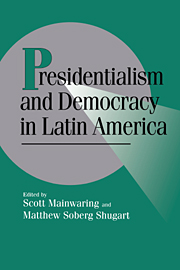Book contents
- Frontmatter
- Contents
- Contributors
- Acknowledgments
- Introduction
- 1 Presidentialism and Democracy in Latin America: Rethinking the Terms of the Debate
- 2 Multipartism, Robust Federalism, and Presidentialism in Brazil
- 3 The Unrealized Potential of Presidential Dominance in Colombia
- 4 Presidential Behavior in a System with Strong Parties: Venezuela, 1958–1995
- 5 Strong Candidates for a Limited Office: Presidentialism and Political Parties in Costa Rica
- 6 Political Sources of Presidencialismo in Mexico
- 7 Evaluating Argentina's Presidential Democracy: 1983–1995
- 8 In Defense of Presidentialism: The Case of Chile, 1932–1970
- 9 Executive–Legislative Relations in Post–Pinochet Chile: A Preliminary Assessment
- 10 Hybrid Presidentialism and Democratization: The Case of Bolivia
- 11 Conclusion: Presidentialism and the Party System
- Appendix: Outlines of Constitutional Powers in Latin America
- References
- Index
1 - Presidentialism and Democracy in Latin America: Rethinking the Terms of the Debate
Published online by Cambridge University Press: 05 June 2012
- Frontmatter
- Contents
- Contributors
- Acknowledgments
- Introduction
- 1 Presidentialism and Democracy in Latin America: Rethinking the Terms of the Debate
- 2 Multipartism, Robust Federalism, and Presidentialism in Brazil
- 3 The Unrealized Potential of Presidential Dominance in Colombia
- 4 Presidential Behavior in a System with Strong Parties: Venezuela, 1958–1995
- 5 Strong Candidates for a Limited Office: Presidentialism and Political Parties in Costa Rica
- 6 Political Sources of Presidencialismo in Mexico
- 7 Evaluating Argentina's Presidential Democracy: 1983–1995
- 8 In Defense of Presidentialism: The Case of Chile, 1932–1970
- 9 Executive–Legislative Relations in Post–Pinochet Chile: A Preliminary Assessment
- 10 Hybrid Presidentialism and Democratization: The Case of Bolivia
- 11 Conclusion: Presidentialism and the Party System
- Appendix: Outlines of Constitutional Powers in Latin America
- References
- Index
Summary
In recent years, many scholars have argued that the presidential form of government has been a major contributor to the travails of democracy in Latin America. This argument has been widely accepted, and there are few published counterarguments. However, as we hope to make clear in this chapter, the evidence in favor of the antipresidentialist position is weaker than often assumed. The empirical argument against presidentialism is based mostly on the Latin American experience. The failure of presidential democracies in this part of the world has led many scholars to assert that parliamentary regimes would fare better. There are two difficulties with this argument: (1) presidential democracy has existed mostly in Latin America, making it hard to disentangle those obstacles to democracy in Latin America that stem from the regime type and those that stem from socioeconomic or other factors; and (2) parliamentary democracy exists almost exclusively in Europe or former British colonies, which should make us suspicious of arguments that parliamentarism would perform as well outside these settings. To be sure, critics of presidentialism and advocates of parliamentarism have not made their case entirely on empirical grounds; they have developed compelling logical defenses of their positions, too. However, as we hope show, equally compelling cases can be made in favor of presidentialism and against parliamentarism.
Where does this leave us? We shall argue that it raises doubts about whether one regime type is clearly superior to the other.
- Type
- Chapter
- Information
- Presidentialism and Democracy in Latin America , pp. 12 - 54Publisher: Cambridge University PressPrint publication year: 1997
- 94
- Cited by



